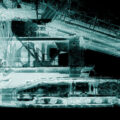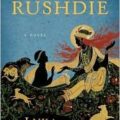Amplified by the Ultrasound: Keith Leonard’s Ramshackle Ode

Keith Leonard’s first full-length collection, Ramshackle Ode, transforms the poetry of praise into a celebration of the imperfect—in particular, the imperfections of the author’s life. The poems of Ramshackle Ode narrate the speaker’s biography across a series of cinematic jump cuts. He recalls, reflects, mourns, and celebrates while addressing and negotiating ideas of family, gender, love, and parenthood. Plain-spoken, wry, wistful, whimsical, and joyful, achieving a remarkable authenticity of voice throughout, Leonard’s long single stanza poems are sleek and swift as they run down the page, commanding the reader’s attention. His language sings of a world “all skunk breath and beautiful.” As he writes in “Ode to the Odes”:
… I don’t know
if I’m making much sense here,
but this morning
my honey hunny
kissed me on the lips
…
… does it ever come to you
like a vanilla-scented wind—
this happiness? Does it
tug at your throat
until out pops a pigeon,
scum-soaked and carrying
a love note
you didn’t know
you could write?
While the timbre and tone of the voice may vary from poem to poem, there is an unmistakable unity from the first poem all the way through to the last. His objective is to confront his own biographical narrative—full of symbolic details—while constructing a version in which honesty illuminates choice. In “The Game as Good Medicine,” basketball becomes a metaphor for living and writing, which is to say, loving. “I say hooray to the no-look dish / and the ball kissing the glass before netting… Today, I want to love / the loop of the game….” The speaker says, “Isn’t it good to do / one thing well / then try to do it again?” To be successful in life, one must practice; not only what comes easily, but what is difficult as well. One needs to stay close to difficulty. Children are taught that history moves in a straight line, but, “I remember chapter one / led to chapter two / and we reached our present in June…” People are warned to keep their distance, precisely because “…the problem with distance is it makes one forget. / The problem is honesty / comes shaped like a circle. / Like a loop…”

Ramshackle Ode
by Keith Leonard
Softcover, $17.95
Mariner Books, 2016
“Keel,” the brilliant opening poem, consists of a single headlong sentence addressing the speaker’s beloved. The “little skiff” with only a keel to keep it on course is “boot-thudded and shoal-scraped,” enduring its difficult existence on the open sea, loveless and unlovable like the speaker. From a changed vantage point, the speaker recognizes that “I was my own / storm once, so young / and eager to raise the sail of my own wanting, / that he was unable to meet the needs of someone else. But now, he can both give and receive love, and appreciates the value of the “old boat, / this settled-in thing.”
In “The Doubling,” Leonard offers the reader the uncommon male perspective on birth and parenthood. Like “Keel,” it is an exclamation, written as a long end-stopped stanza, with a coda of three short sentence fragments. Its voice is incantatory, “it is not blood, but like blood … the sound is not a heart, but like the heart …” the energy barely contained like “this world swelling ….” as it seems to in sympathy with the growing of the child, the swelling of the mother’s belly, and “smack-the-screen joy….” at the impending arrival of something bigger than anything that has happened before:
… I rarely think of,
this world swelling, the hay field
rising, and I was not ready
for my love to be suddenly
amplified by the ultrasound,
but it was, the little heart drummed
over the speakers, and the room
swelled …
I could believe the world only wants
to double. The hay field rising
into seed …
“Becoming a father has informed my writing (and living) more than I could have expected,” Leonard told the editors of Vinyl Poetry & Prose. “Having a little boy has forced me to reconsider many of the narratives I was told about masculinity and the narratives our culture continues to tell. I want to write poems that are as tender as possible to make a different narrative available to my son.”
Leonard takes on these narratives most directly in “Becoming the Boy,” “Dead Man Float.” and “Ode to the Unsayable.” The first poem opens with a bold confession: “First, let me admit I am a counterfeit. / A sleek composite…Should / sounds so much like shove, / doesn’t it… You too / began curled and cooed awake, / then some blue lung began to chant / a boy should this and a boy should that, / and you shouldn’t listen….” For a moment, a newborn is free from the shoulds transmitted to so many parents today, but that moment doesn’t last. Parents have to unlearn their own pasts in order to become themselves, a process remarkably similar to Leonard’s project in this volume. The speaker recognizes the harm he suffered and pledges to be true to his own heart, to parent in a new way.
At the midpoint of the collection, “Dead Man Float” offers a graphic restatement of the premise of “Becoming the Boy.” Leonard writes, “To need help / was a weakness. We were boys. / It was a game / we made ourselves.” Here masculinity depends on an independence, perhaps a cruelty, that goes unquestioned.
Leonard’s “Ode to the Unsayable” brings this narrative of American masculinity into clearest relief:
here was a word
I was taught
not to say
in the gym, or on
the basketball court,
the playground
and sometimes
at home…
And yes, maybe
there are words
we should smother
to oblivion,
but what
if I told you
the word I kept
locked…
was, in fact,
love?….
In a suite of three poems, “Elegy,” “In This Photo, James,” and “A Brief History of Evolution,” the reader sees the speaker in revealing interactions with his late brother, who embodies the masculine characteristics that both terrify and tempt the speaker. “Elegy” presents a sparse series of fragments about the speaker’s late brother. Like drawing on a fogged mirror, the speaker traces an outline of James’s face on a damp table in a coffee shop. It is ephemeral, as such things are, as quickly vanished as the life the speaker now mourns. The poem’s closing lines reflect the obsessive and aggressively skeptical state of loss: “this isn’t it / It isn’t this / Isn’t it this / Isn’t this it.” No matter how the words are rearranged, the fact remain unaltered.
In the companion piece, “In This Photo, James,” the speaker meditates on an actual photograph of James sitting on a green couch, “with his hand raised / like a conductor’s / quieting the orchestra—…” While written in short stanzas, not fragments, the impact is devastating. James is laughing or possibly smiling. The speaker remembers climbing over a pasture’s barbed wire fence, “because we wanted / to be someplace / we didn’t belong.” James sustains a cut, “it didn’t matter: Let’s just go back, I said.”
The speaker is courting danger, but James is the one who really wants to continue, “And he held up his hand and said, No really, it’s fine.”
The equally dark “A Brief History of Evolution,” written in enjambed couplets, shows a horrifying scene of masculine brutality enacted by the speaker’s brother—who is, in all ways, the opposite of the speaker himself. “When did my brother first let his toes / hang over the lip of a quarry cliff, … When did he learn that a rainbow / would appear on a wall / from the light shot off a carving knife?” This twinning of beauty and brutality is fundamental to Leonard’s work, the frisson that energizes his carefully crafted poetry. Later in the poem, he compares his brother to the “small smell of propane / leaking from a tank / attached to a house.” Leonard sustains this tension with a cruel game, “rac[ing] a finger-long mouse / against a tail of flame / and I would watch For Leonard, the act of watching is both to learn and to remain safe from the surrounding unrest.
The poems of Ramshackle Ode observe, engage, and critique the past, while pressing for change with an urgent voice. While acknowledging the cruelty and ugliness in family life, the speaker recognizes grace in the quotidian, something worthy of his attention and praise. From the bounty of honeysuckle, its “every amber bead of sweet,” to the impossible journey of monarch butterflies, feeding on milkweed nurtured by “the reeking / kitchen scraps / so they might / once again bloom.” to the most personal moment of birth, the speaker is witness to the twinning of brutality and beauty, the mingling of blood and breath. As Leonard writes in “The Third Commandment”:
… —and goddamn—
the boy was pushed into this world …
serrating my every theory
of the possible …
the country of amazement
has no lexicon or address—
that country’s charter
was written in a single breath.
Read these poems for their quiet pyrotechnics, their willful independence, and for the lived truths that are so evident in their making. That small skiff, battered but whole, has brought the speaker to a new place. Leonard’s Ramshackle Ode rejoices in the imperfect. Free of rhetoric, these poems surge toward wholeness; turn towards love, “I’ll say it / again: love. / And again: love” and the immense importance of human relationships.
About Eve Linn
Eve F.W. Linn received her M.F.A. in Creative Writing with a concentration in poetry from Lesley University and her B.A. cum laude in Studio Art from Smith College. Eve has attended the Bread Loaf Writers Conference and the Frost Place's Conference on Poetry. She lives in Massachusetts with her family.





